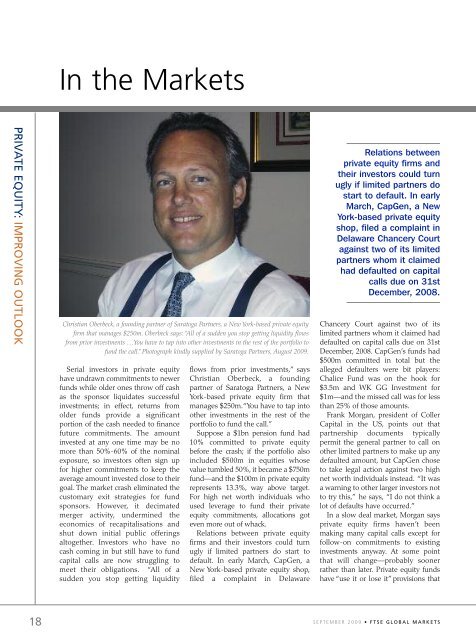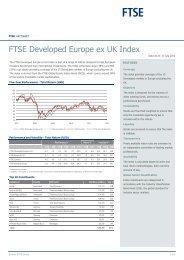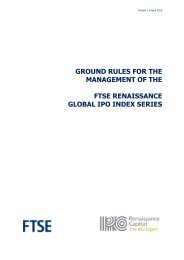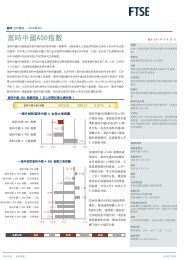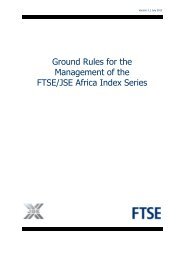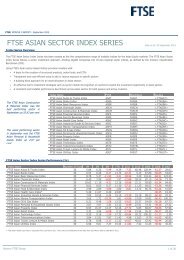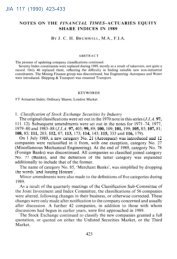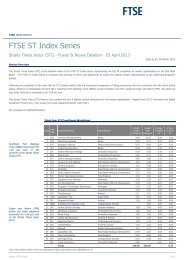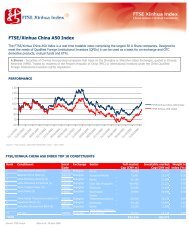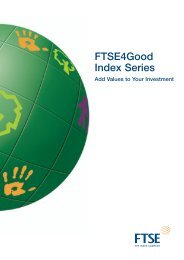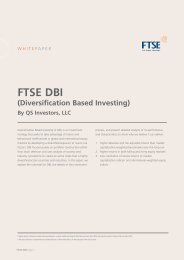Create successful ePaper yourself
Turn your PDF publications into a flip-book with our unique Google optimized e-Paper software.
PRIVATE EQUITY: IMPROVING OUTLOOK<br />
18<br />
In the Markets<br />
Christian Oberbeck, a founding partner of Saratoga Partners, a New York-based private equity<br />
firm that manages $250m. Oberbeck says: “All of a sudden you stop getting liquidity flows<br />
from prior investments …You have to tap into other investments in the rest of the portfolio to<br />
fund the call.” Photograph kindly supplied by Saratoga Partners, August 2009.<br />
Serial investors in private equity<br />
have undrawn commitments to newer<br />
funds while older ones throw off cash<br />
as the sponsor liquidates successful<br />
investments; in effect, returns from<br />
older funds provide a significant<br />
portion of the cash needed to finance<br />
future commitments. The amount<br />
invested at any one time may be no<br />
more than 50%-60% of the nominal<br />
exposure, so investors often sign up<br />
for higher commitments to keep the<br />
average amount invested close to their<br />
goal. The market crash eliminated the<br />
customary exit strategies for fund<br />
sponsors. However, it decimated<br />
merger activity, undermined the<br />
economics of recapitalisations and<br />
shut down initial public offerings<br />
altogether. Investors who have no<br />
cash coming in but still have to fund<br />
capital calls are now struggling to<br />
meet their obligations. “All of a<br />
sudden you stop getting liquidity<br />
flows from prior investments,” says<br />
Christian Oberbeck, a founding<br />
partner of Saratoga Partners, a New<br />
York-based private equity firm that<br />
manages $250m.“You have to tap into<br />
other investments in the rest of the<br />
portfolio to fund the call.”<br />
Suppose a $1bn pension fund had<br />
10% committed to private equity<br />
before the crash; if the portfolio also<br />
included $500m in equities whose<br />
value tumbled 50%, it became a $750m<br />
fund—and the $100m in private equity<br />
represents 13.3%, way above target.<br />
For high net worth individuals who<br />
used leverage to fund their private<br />
equity commitments, allocations got<br />
even more out of whack.<br />
Relations between private equity<br />
firms and their investors could turn<br />
ugly if limited partners do start to<br />
default. In early March, CapGen, a<br />
New York-based private equity shop,<br />
filed a complaint in Delaware<br />
`<br />
Relations between<br />
private equity firms and<br />
their investors could turn<br />
ugly if limited partners do<br />
start to default. In early<br />
March, CapGen, a New<br />
York-based private equity<br />
shop, filed a complaint in<br />
Delaware Chancery Court<br />
against two of its limited<br />
partners whom it claimed<br />
had defaulted on capital<br />
calls due on 31st<br />
December, 2008.<br />
Chancery Court against two of its<br />
limited partners whom it claimed had<br />
defaulted on capital calls due on 31st<br />
December, 2008. CapGen’s funds had<br />
$500m committed in total but the<br />
alleged defaulters were bit players:<br />
Chalice Fund was on the hook for<br />
$3.5m and WK GG Investment for<br />
$1m—and the missed call was for less<br />
than 25% of those amounts.<br />
Frank Morgan, president of Coller<br />
Capital in the US, points out that<br />
partnership documents typically<br />
permit the general partner to call on<br />
other limited partners to make up any<br />
defaulted amount, but CapGen chose<br />
to take legal action against two high<br />
net worth individuals instead. “It was<br />
a warning to other larger investors not<br />
to try this,” he says, “I do not think a<br />
lot of defaults have occurred.”<br />
In a slow deal market, Morgan says<br />
private equity firms haven’t been<br />
making many capital calls except for<br />
follow-on commitments to existing<br />
investments anyway. At some point<br />
that will change—probably sooner<br />
rather than later. Private equity funds<br />
have “use it or lose it” provisions that<br />
S E P T E M B E R 2 0 0 9 • F T S E G L O B A L M A R K E T S


